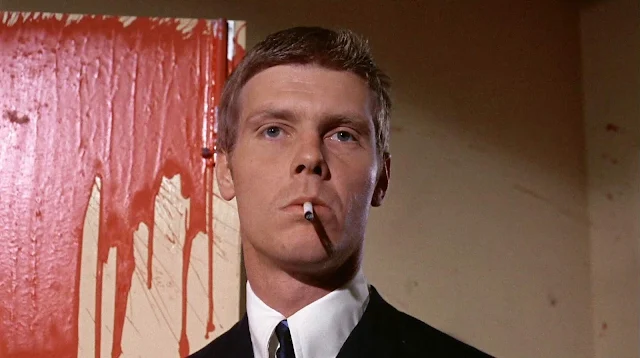Performance (Donald Cammell, Nicolas Roeg, 1970)
Cast: James Fox, Mick Jagger, Anita Pallenberg, Michèle Breton, Johnny Shannon, Anthony Valentine, Ann Sidney, John Bindon, Stanley Meadows, Allan Cuthbertson, Anthony Morton. Screenplay: Donald Cammell. Cinematography: Nicolas Roeg. Art direction: John Clark. Film editing: Anthony Gibbs, John Smedley-Aston. Music: Jack Nitzsche.
I’m so used to seeing James Fox as a proper upperclass Brit in films like A Passage to India (David Lean, 1984) and The Remains of the Day (James Ivory, 1993) that it took me a while to identify him with the kinky gangster Chas he plays in Performance. In fact, it’s a role that writer and co-director Donald Cammell intended for Marlon Brando. But Fox, with his veneer of handsome self-assuredness, fits the film perfectly as the foil for MIck Jagger’s sybaritic rock star, Turner. It’s a film about outlaws from two worlds, the criminal Chas and the artist Turner coming together on the artist’s turf. It’s also a kind of Götterdämmerung for the swinging ‘60s, made during the ‘60s but held from release until the selfish ‘70s by a squeamish studio, its sex and nudity edited out but restored, at least partially, later. It’s visually and narratively challenging, with time- and place-switching editing to the point that it still provokes exegesis. It launched co-director and cinematographer Nicolas Roeg’s career, and it may have doomed Cammell’s. In short, it’s some kind of important film, but no one has ever been able to pin down exactly why. The very definition of a cult film.





.jpg)





.jpg)



